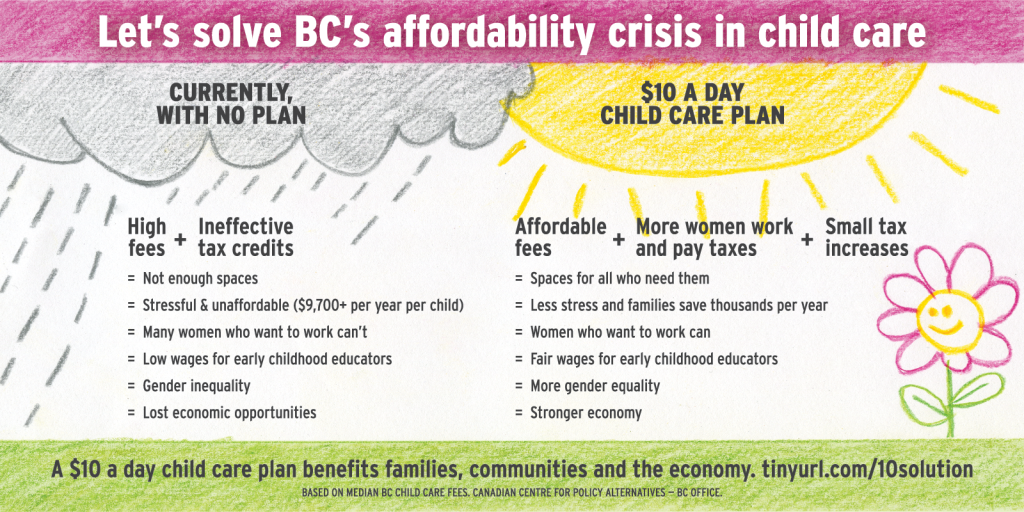$10 a day child care: smart public policy whose time has come
Imagine if the BC government put as much energy and effort into solving BC’s child care crisis as it does in promoting LNG. This week, our Premier recalled the legislature from its regular summer break to pass special laws paving the way for one potential LNG project (more about why this is a bad deal here and here). What if there was a special legislative session to pave the way for building an affordable, quality child care system in BC?
If the large body of evidence is to be believed (and it is very compelling), this would yield a number of social and economic benefits. High-quality early childhood education promotes healthy child development and increases educational achievement for all children, with particular benefits to the most vulnerable. It also promotes social inclusion, advances gender equality by allowing mothers to return to work, and strengthens the economy.
Yet BC and Canada are laggards by international standards, investing far less than what is required to ensure all children can thrive. Small enhancements to the status quo (like the BC Early Years Strategy) are just not cutting it — we need a change in priorities.
The call for public investment in a national child care program is not new and is supported by a diverse group of organizations, from child care advocates to physicians organizations, early childhood development experts, business groups and economists. Two and a half years ago, TD Bank’s chief economist argued child care should be a top spending priority for governments after deficits are eliminated. Guess what? BC returned to surplus in 2013/14.
During the most recent provincial budget consultation, the bipartisan committee of 15 MLAs preparing the BC Budget 2015 Consultation report unanimously recommended that BC “provide funding and support for the development and implementation of a child care plan” (see recommendation 40 in the report). This recommendation was ignored in Budget 2015.
Child care experts in BC have developed a plan that would transform the existing patchwork of programs into a universal, high quality, affordable child care system that integrates early learning and care. It would reduce fees to $10 a day, create enough spaces for all families who want them, and increase the quality of care. This $10 a day child care plan has gathered support across the province, from businesses, local governments and academics.
When BC’s political leaders are asked about $10 a day child care, they wring their hands and tell us that unfortunately we simply can’t afford it (for example here). How could this be true when BC is one of the richest provinces in one of the world’s richest countries, and when we are running budget surpluses for over two years now? It’s not.
In a recently published CCPA study, I show that the $10 a day child care plan is entirely affordable either as a federal-provincial partnership or as a BC-only program like the one in place in Quebec. Drawing on research from Quebec, which has had a provincial child care plan since the 1990s, I find that in BC $10 a day child care would be largely self-financing, through the considerable boost to provincial and federal government revenues from more women participating in the workforce.
I propose small, affordable increases in personal and business taxes to raise the additional revenues BC needs to provide quality early education and child care for all children in BC. For the vast majority of people, these changes would mean paying between $20 and $80 more per year. This is a bargain for what we’d get with universal quality child care: healthy child development, improved social inclusion, more gender and income equality and economic prosperity.
It’s time we stop treating child care as a side issue, or a women’s issue, and treat it like the national economic priority that it is for all of us.
Topics: Children & youth, Economy, Poverty, inequality & welfare, Taxes, Women



